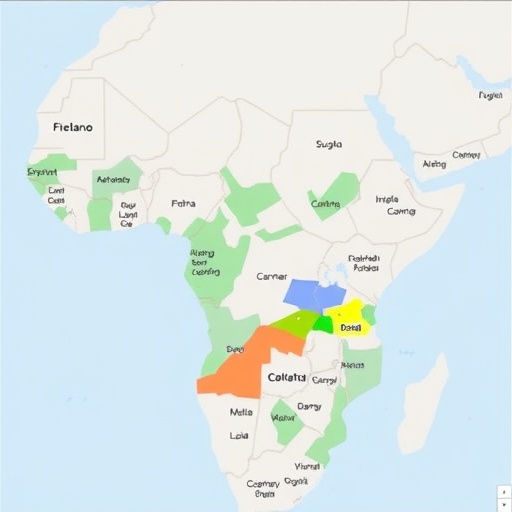In a groundbreaking study published in the journal Applied Research Quality of Life, researchers have unveiled essential findings regarding the EuroQol EQ-5D-3L quality of life population norms for Sierra Leone. This research, led by van Uum, E.D., Vas Nunes, J., and Van der Stelt, M., provides critical insights into the health-related quality of life metrics in a country grappling with unique challenges. The comprehensive investigation not only offers an invaluable tool for assessing health outcomes but also highlights the broader implications for public health and policy in Sierra Leone.
The study’s launch is poised to have a substantial impact on understanding how health and quality of life interconnect within the specific context of Sierra Leone. The country, marked by a history of conflict, disease outbreaks, and socioeconomic difficulties, presents a distinct demographic that necessitates tailored health assessments. By utilizing the EQ-5D-3L, the researchers have developed norms that reflect the lived experiences of Sierra Leone’s population, thus providing a robust framework for future health-related studies and interventions.
Equipped with a widely recognized instrument, the researchers have meticulously evaluated various dimensions of health-related quality of life, including mobility, self-care, usual activities, pain/discomfort, and anxiety/depression. These facets are fundamental to understanding an individual’s overall health status. The EQ-5D-3L allows for responses that capture the nuances of personal health experiences, offering a multi-faceted view of quality of life that is particularly relevant in regions where healthcare resources are scarce.
One of the significant findings aligns with global health trends, revealing that individuals in Sierra Leone confront notable challenges in all domains of the EQ-5D-3L framework. The data highlights that a substantial number of respondents experience difficulties with mobility and self-care, which can be attributed to various factors including access to healthcare services, infrastructural challenges, and prevalent health issues. These findings underscore the urgent need for continued investment in health infrastructure and community-centered health initiatives.
Moreover, the research discusses the impact of socio-economic factors on health perceptions in Sierra Leone. Given the country’s ongoing recovery from a devastating civil war and the effects of the Ebola outbreak, many individuals face compounded challenges affecting their overall well-being. The relevancy of these findings extends beyond mere data; they serve as a clarion call for policymakers, urging them to prioritize mental health and physical well-being in their agendas.
The unique contributions of the study are pivotal as they set a new standard for future quality of life research in underrepresented regions. By establishing robust population norms, this research equips health professionals and policymakers with the necessary tools to design interventions that are sensitive to the specific cultural and socio-economic context of Sierra Leone. The establishment of local quality of life metrics empowers stakeholders to implement more effective health strategies tailored to community needs.
Additionally, the article places significant emphasis on the importance of cultural considerations when it comes to interpreting health-related quality of life data. The EQ-5D-3L is designed to be adaptable across diverse populations, yet understanding the cultural context is crucial for accurately assessing health outcomes. The researchers advocate for more inclusive methods that take into account the sociocultural backgrounds of respondents, which will enrich the discourse surrounding health equity.
This pivotal study not only contributes to the academic literature but also opens avenues for collaborative research efforts. By sharing their findings, the researchers encourage other scholars and practitioners to explore similar methodologies in varying contexts throughout Africa and beyond. The ability to compare findings across different regions could yield invaluable insights into health disparities and the effectiveness of public health interventions.
The presence of health-related quality of life norms will also enable Sierra Leone to engage more rigorously in international health discussions. As global health organizations strive to establish benchmarks, countries with robust data can more effectively advocate for support and resources. This research empowers Sierra Leone to tell its own health story, grounded in empirical evidence, thus influencing global health agendas.
The journey of this research from inception to publication reflects the commitment of the authors to shine a light on often overlooked populations. It challenges prevailing narratives and emphasizes the importance of data-driven advocacy in public health. The legacy of this research may not only enhance the understanding of health in Sierra Leone but also inspire a new generation of researchers to pursue the groundbreaking exploration of quality of life metrics in various underrepresented communities globally.
In conclusion, the study led by van Uum and colleagues heralds a significant advancement in understanding the quality of life in Sierra Leone. The establishment of EQ-5D-3L norms stands as a testament to the resilience of the nation and its people. It combines scientific inquiry with social justice, ultimately aiming to elevate the standards of health and well-being in Sierra Leone in the long term. As this research encapsulates the essence of hope for a better future, it will undoubtedly serve as a catalyst for change and improvement in healthcare throughout the region.
Each insight derived from this rigorous investigation is a step toward addressing the multifaceted challenges that confront Sierra Leoneans daily. Through continuous research, collaborative efforts, and an unwavering commitment to improving health outcomes, the narrative surrounding quality of life can be reshaped, ultimately paving the way for a healthier, more equitable society.
Subject of Research: Quality of Life Population Norms in Sierra Leone
Article Title: EuroQol EQ-5D-3L Quality of Life Population Norms for Sierra Leone
Article References:
van Uum, E.D., Vas Nunes, J., Van der Stelt, M. et al. EuroQol EQ-5D-3L Quality of Life Population Norms for Sierra Leone.
Applied Research Quality Life (2025). https://doi.org/10.1007/s11482-025-10478-2
Image Credits: AI Generated
DOI:
Keywords: Quality of life, EQ-5D-3L, Sierra Leone, health metrics, public health.




